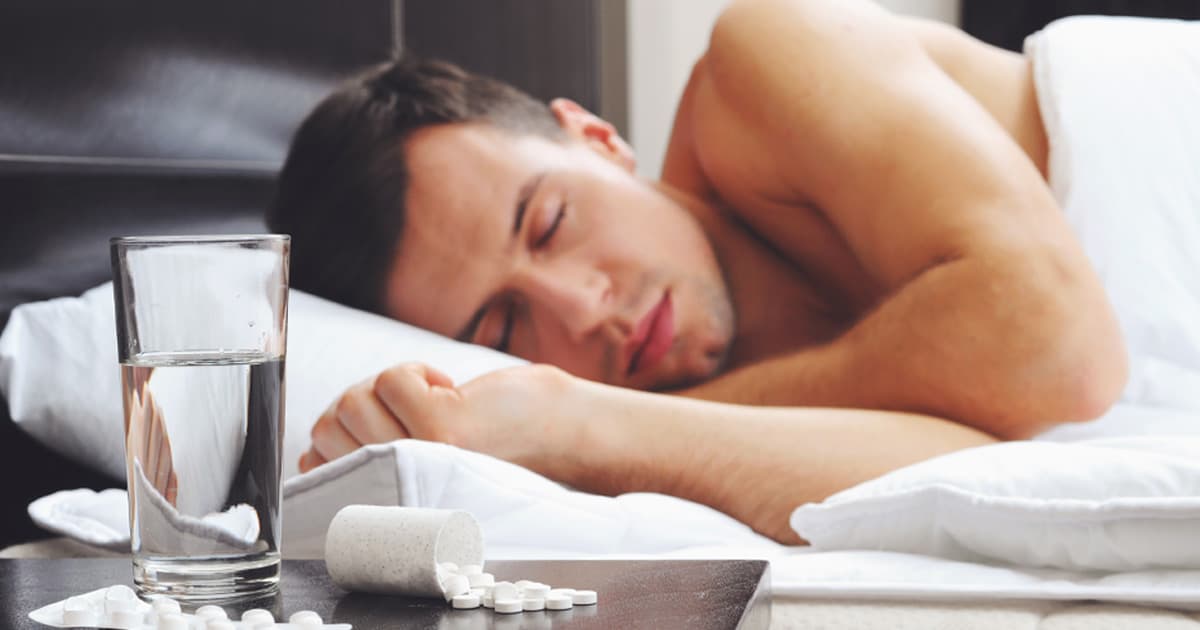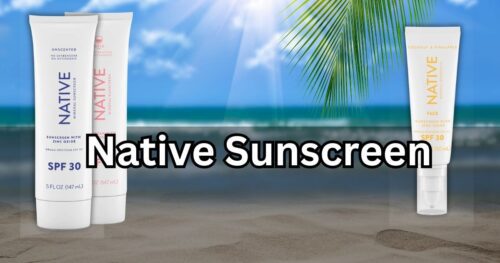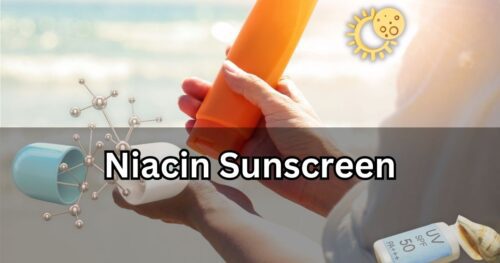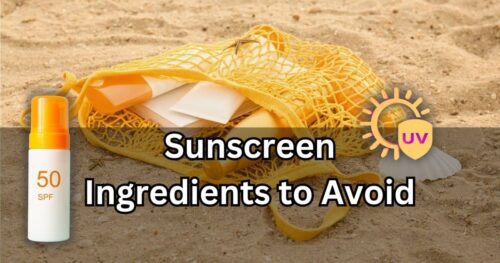You forgot to protect your skin against the sun’s harmful UV rays. Now you ended up with a sunburn. You’re not alone, and many suffer from the same misery. It could be painful and sometimes unbearable at night.
There’s no immediate cure; a sunburn usually takes 2-3 days to heal. If it’s severe, it could take more. Sunburned skin becomes sensitive and can catch infections easily.
But the good news is there are many ways to get relief from symptoms and get a good night’s sleep.
You can sleep comfortably with sunburn by taking over-the-counter painkillers. Moisturize your skin and use aloe vera. Wear loose cotton clothing to bed. Stay hydrated and take cool showers with oatmeal, vinegar, or Epsom salt. Avoid soaps, anesthetic creams, and direct ice application on the affected area.
Next, we’ll discuss in detail the methods we suggest to our patients suffering from sunburn. These include the best sleeping positions for sunburn on different body parts and what to wear to bed. Along with discussing sunburn treatments, we’ll offer advice on reducing pain before bed.
Table of Contents
Effects of Sunburn on The Skin
Sunburn can damage our skin cells and even our DNA. Our body reacts with an increased blood supply to the sunburned area to clear out the damage, remove dead skin cells, and speed up the healing process. This increased blood supply causes inflammation, visible as redness on the skin.
Sunburn symptoms include pain, irritation, swelling, and redness on the skin. In severe cases, fever with chills, headache, blisters, and skin peeling may also be seen. Always consult your doctor in extreme cases.
Now that you understand how it’s caused let’s learn how to sleep comfortably with a sunburn.
Relief Options
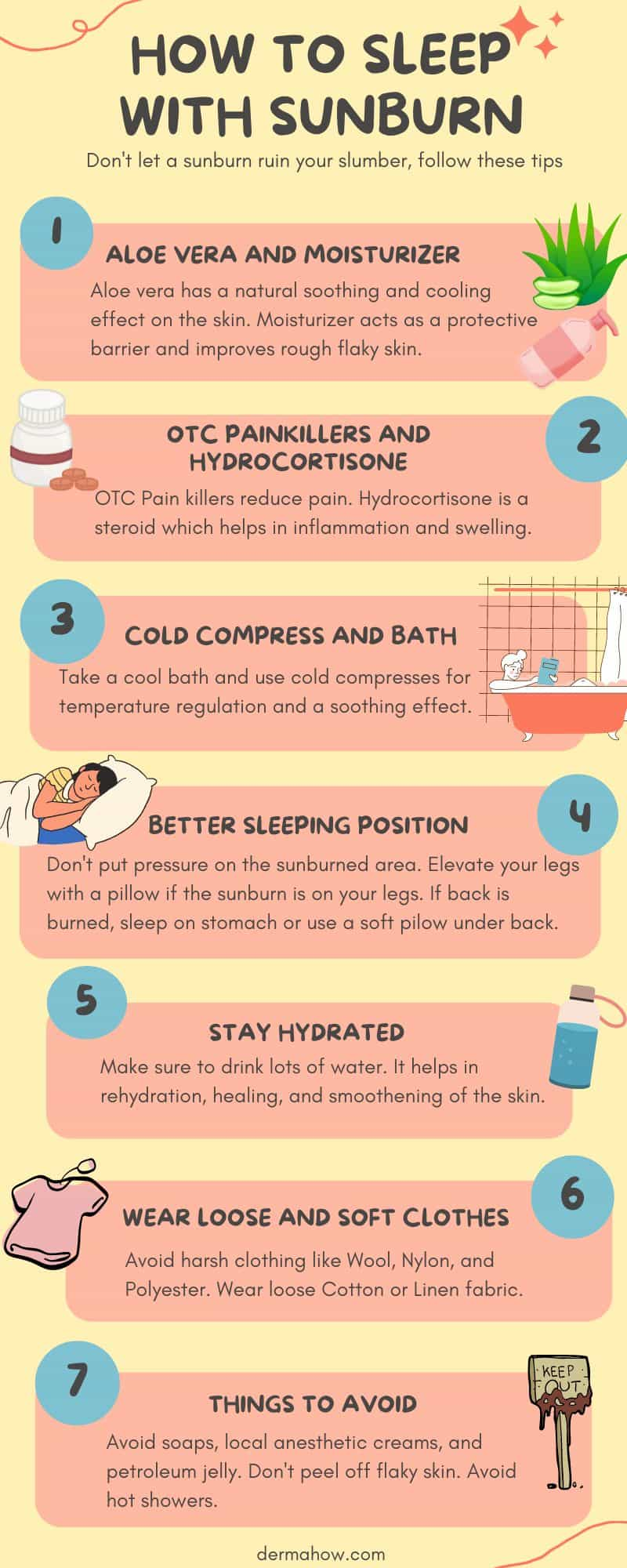
1. NSAIDS
NSAIDs will not only relieve pain and inflammation but also help in discomfort and aggravation of symptoms at night.
Pain-relieving medication is also available in the form of creams and sprays. I suggest my patients take oral painkiller tablets.
If the sunburned area is smaller and the pain intensity is more significant, then cream or gel form of painkiller like piroxicam gel can be used with oral tablets.
In any case, follow the dosage guidelines of these medicines.
2. Hydrocortisone cream
Hydrocortisone cream can reduce irritation and inflammation significantly. Hydrocortisone is a steroid drug. Steroids are also produced naturally in our bodies. These are used by the body to control immune responses and stress to any organ.
3. Drink fluids
Sunburn can lead to dehydration and loss of fluid from the body. Sunburns continuously draw fluid out of the body through the skin. Make sure to drink lots of water. It helps in rehydration, healing, and smoothening of the skin.
4. Aloe Vera
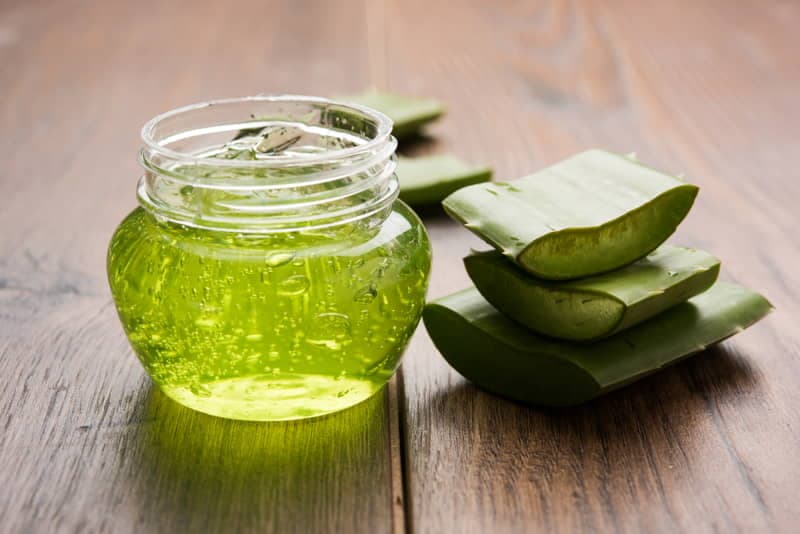
You may have heard of Aloe vera gel several times and its beneficial role for the skin. It has a natural soothing and cooling effect on the skin. According to a study, it also has vitamins, including A, E, and antioxidants. It provides anti-inflammatory effects, which help reduce swelling and promote healing.
Look for natural aloe vera directly from the plant.
Apply aloe vera to the sunburned area before going to bed. It may feel sticky, but you have to bear with it for its miraculous benefits.
- Cut a leaf from an aloe vera plant
- Remove the outer covering and squeeze out the gel
- Apply on the sunburnt skin and leave it for 1-2 hours
- Clean the skin with a damp cloth
Alternatively, you can use non-sticky aloe vera gel, available in various packaging. But remember to avoid products with any additives or fragrances. These ingredients can be harmful to the skin.
5. Cool Compress
Cool compresses are beneficial as they reduce inflammation and soothe your skin.
- Take a damp clean cloth or towel
- Soak it in ice-cold water
- Apply on the sunburned area for 10-15 min before sleep
You can also use this method several times during the day.
6. Cool Bath
A cool bath can be an excellent method to improve sleep and comfort burnt skin.
You can use vinegar, Epsom salt, or oatmeal. A medical study highlighted the beneficial effects of a cool bath with oatmeal and other treatment options we discussed.
- Fill your bathtub with cool water. Don’t use ice-cold water, as it can damage sensitive skin.
- Add some baking soda, oatmeal, or Epsom salt to the bathwater. It provides relief against inflammation.
- Take a bath for 15-20 minutes.
- Pat dry your skin but don’t rub or scrub the sunburned area hard.
- Do not use soap or hot water. Soaps are irritants, and hot water does not help inflammation.
Epsom salt provides a soothing effect on the skin and reduces inflammation and burning sensation.
Vinegar is known to benefit the skin because of its antiseptic and anti-inflammatory properties. It also helps with flaky skin.
Oatmeal helps soften and moisturize the skin. It also has an excellent anti-inflammatory effect.
7. Never Apply Ice Directly On The Skin
Skin is already damaged from sunburn. It’s sensitive, and the threshold for additional damage is very low. In this case, applying ice can further damage it.
I understand some people want to use ice over the sunburned area for instant relief. But it would be best if you avoided this. Ice can cause more harm than good. It can make sunburn worse.
8. Avoid Local Anesthetic Creams And Petroleum Jelly
Dr. Debra Jalima, A Dermatologist, advised:
“Even though it sounds like a good idea, ice is a no-no. The worst thing you can do. Then are you putting a cold burn on top of a hot burn. Likewise, avoid creams with local anesthetics. They might feel good, they tend to have severe reactions from that. And another thing to avoid, butter or petroleum jelly, it keeps heat in the skin. Use a light moisturizer instead to soothe the skin.”
Local anesthetic creams may provide short-term relief but can cause itching and other side effects later.
9. Air Conditioning
Sleep at a moderate temperature. The inflammation can increase your body temperature and cause a night fever. Use air conditioning to cool off the temperature. Make sure the air doesn’t directly blow on your skin.
10. Moisturize
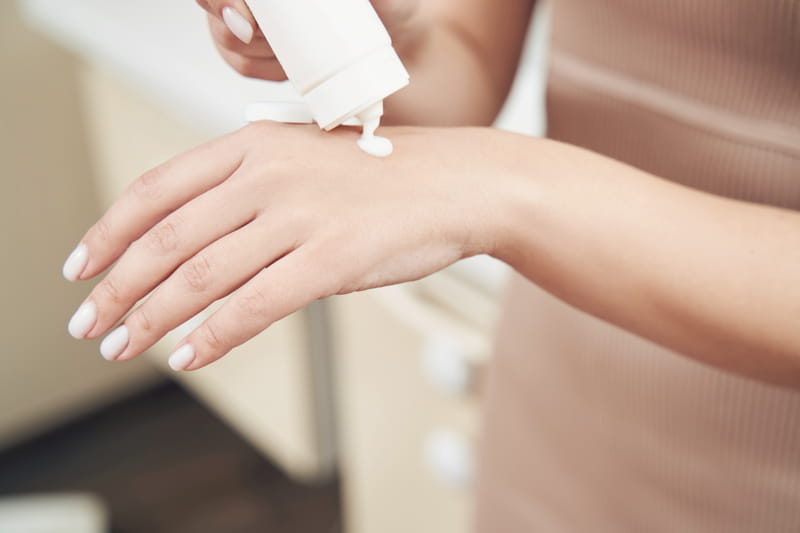
In some cases, the skin becomes scaly and rough. It’s because of the damage and dehydration caused by sunburn. You must moisturize your skin to prevent scaling and further dehydration.
Moisturizer acts as a protective barrier against dehydration and frictional skin damage. It also provides a much-needed softening and soothing effect on damaged skin.
The best time to apply moisturizer is after a cool shower.
11. Stay In The Shade
When you’re already sunburned, the worst thing you can do is to keep going into the sun again. It not only causes additional damage to weakened skin but also slows down healing.
Keep in the shade and try to stay hydrated indoors.
Not all shades offer equal sunburn protection. The best way is to block the sun’s UV rays inside your house completely. To understand, you can read about sunburn in the shade here.
12. Better Sleeping Position
Try to avoid lying on the side of sunburned skin. Sleeping Position depends upon the location of the burn.
How To Sleep With A Sunburn On Your Legs
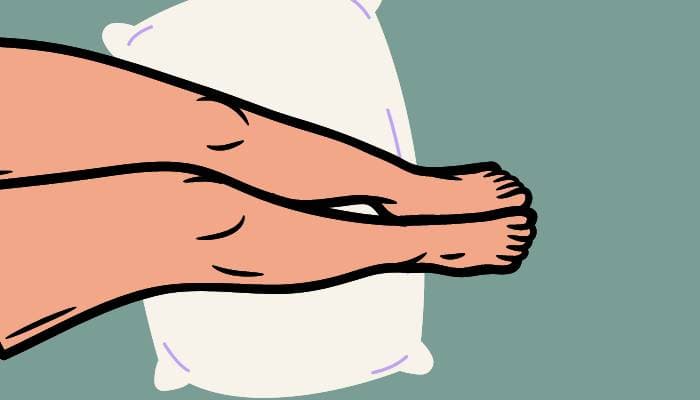
Keep your legs elevated. Use one or two pillows to raise your legs above the level of your body.
This will prevent the pooling of blood in the legs.
Because of inflammation caused by sunburn, blood vessels in the legs are enlarged. Hence, blood can pool easily due to gravity.
How To Sleep With a Sunburn On Back And Shoulders
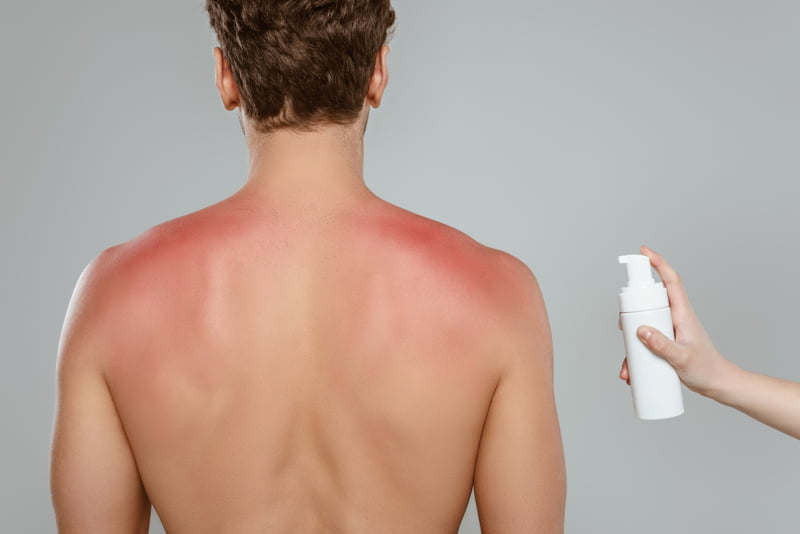
Use a rolled-up towel or a pillow to support your back. It reduces the pressure and creates a cushioning effect.
You can also sleep on your stomach to avoid putting pressure on the back or shoulders.
If the sunburn is just on the shoulders, you can sleep on your back with a rolled-up towel or pillow under your shoulders.
In general, find the best sleeping position you’re comfortable with while avoiding pressure on the burned area.
13. Avoid Peeling and Rubbing The Skin
Sometimes a bad sunburn can also cause flaky skin. Peeling off flaky skin can be tempting, but you must resist the urge. It can lead to further skin damage and infection. Avoid using harsh exfoliants and scrubs during the shower.
Use a gentle circular motion and apply aloe vera or moisturizer to flaky areas.
Instead of using your fingernails to scratch an itch, use a soft, clean towel to pat the area gently.
14. Avoid Soaps
Avoid using soaps as they can increase irritation. You can use a gentle cleanser if you want to clean your skin.
Additionally, soaps can add to the dryness caused by sunburn.
15. What To Wear To Bed With Sunburn
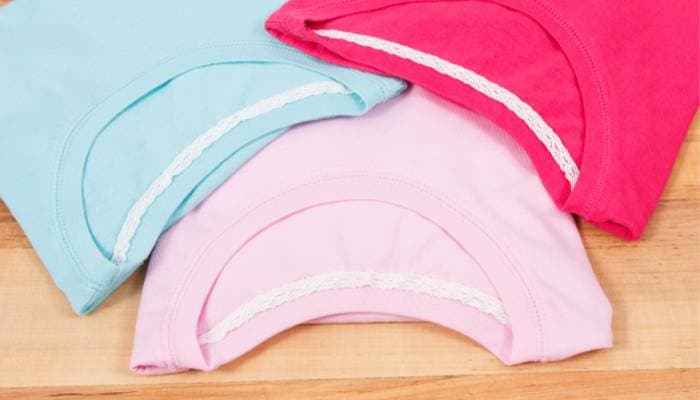
Clothing plays a vital role in your sleep quality when you have sunburn. The tight and harsh dress can disrupt a good night’s rest by causing friction, irritation, and pain.
- Don’t wear harsh clothing like Wool, Nylon, and Polyester. You might not want to wear silk clothing if you’ve applied aloe vera or moisturizer.
- Use loose and comfortable clothing made of preferably cotton. You can also use linen.
- Do not use clothing with zippers, buttons, or any other hard material attached.
- It is preferable to sleep without clothing as long as the sheets are not harsh on the skin. They ought to be neat and soft. Choose 100% cotton sheets if possible.
- Cotton sheets help better temperature regulation and don’t allow the heat to trap.
- Use a pillow between your knees if you’re sleeping on your sides.
You can fall asleep more peacefully with a sunburn and speed up recovery by wearing loose-fitting, breathable clothing and avoiding anything that could rub or irritate the skin.
Medical Help
In case your sunburn is severe, you should immediately seek medical help. The following symptoms indicate a bad sunburn:
- Fever with chills
- Dizziness
- Large body area involvement
- Blisters
- Break in the skin
Pressure of The Body Hurts Sunburned Skin More at Night
You might have thought why does sunburn hurt more at night?
When our body is active during the hustle and bustle of the day; it doesn’t feel the pain as much.
During the day, sunburned skin is generally not in contact with anything except your clothing. But the story is different at night. Your tender, sensitive, sunburned skin has to bear the weight of your entire body.
The contact of bed sheets and clothing with sunburned skin and the pressure on the body causes increased pain, discomfort, and skin irritation.
If you cannot fall asleep and pain and itching keep waking you up repeatedly, don’t worry; it’s natural for a sunburn to cause all this. You have to follow the plan: use cool compresses, drink a glass of water, apply some aloe vera or moisturizer, and you’re good to go. Remember to take a painkiller as well.
Medical Study: Symptoms of Sunburn Gradually Worsen Over Time
A study suggests when we’re sunburned during the day, symptoms gradually start to kick off and reach their peak hours later, during nighttime. That’s why when we initially get sunburned, we don’t feel much pain, but as time passes, symptoms gradually increase in severity.
How To Sleep With Sunburn Blisters
Sunburn blisters may need medical attention. They can lead to many complications. Always remember:
- Do not pop, scrub, or scratch sunburn blisters; They can lead to infection or scar marks on the skin
- Damaging the blisters can delay the healing process
- Apply a soft, cold, damp cloth on the affected skin before sleep
- Wear soft and loose clothing when going to sleep
Talk to your doctor about prescription or over-the-counter pain relievers if you’re in a lot of discomfort or have pain.
Conclusion
Sleeping with sunburn is a tough ask. But you can easily breeze through these phases by taking a few steps.
Keep yourself hydrated, shower before sleep, and use loose clothing fabric and bed sheets. Use aloe vera gel and moisturizer on your skin. Take painkillers for inflammation and relief.
Try to sleep on your side with a pillow between your knees or in another position that doesn’t exert pressure on the affected spot.
Remember to protect yourself from harmful UV rays in the future.
FAQs
If sunburned, should I sleep with or without shirt?
It is better to sleep without a shirt, given your bedsheet is soft. Bedsheet fabric should be cotton, bamboo, or any other soft material.
Sleeping without a shirt reduces a layer of cloth contact with the skin.
Can a sunburn cause night sweats?
Sunburn causes inflammation. It leads to raised body temperature, which can cause night sweats. Take anti-inflammatory medicine like ibuprofen. You can also use cold compresses for relief.
Does sleep help sunburn?
Sleep can heal your skin from sunburn and promote recovery. It is important to remember not to put pressure on the affected area, or it may lead to slow healing.

